When it comes to going for vacation, urban dwellers normally choose to travel overseas and visit interesting destinations around the world. At the end of the trip, they will feel exhausted and sometimes unsatisfied (depending on the tour programme). I am a frequent traveller myself and thus know about it. As a result, I have decided to devote these few days of 'vacation' on recharging myself; in resting my mind and body; and learn something out of it.
We rendezvous at Eunos MRT station at 12noon. We only need to pay for the return bus ride which cost $30. Nevertheless DK and I also made donations for one of the day's (Thursday) morning breakfast. The bus arrival got delayed and we only depart at 2pm.
There are 2 buses with around 60 passengers departing from Singapore in all. We zipped past Singapore's expressways and up to the customs in Woodlands and JB. Thereafter it is a 1 hour bus ride before we arrived at Yong Peng. The bus dropped us to shop for 30mins.
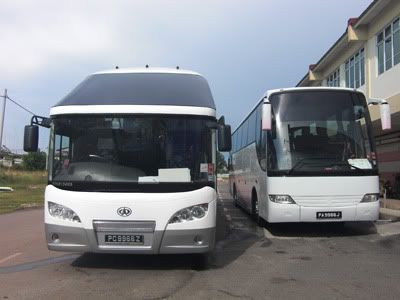
It is almost 5pm when we have our dinner. At 6pm, we departed from Yong Peng and off we go to Bekok. Along the way, I noticed a rainbow in the sky. It is an auspicious sign indeed.
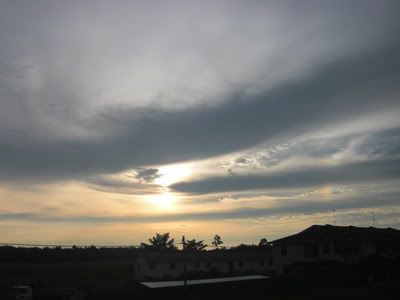
We will be staying at Bekok Guan Yin Temple for the next 9 days. Basically we will not leave the temple compound. Here is the entrance to the temple. If you were to see the timetable later, there are sessions where we do walking meditation, so this is where I will normally hang out.
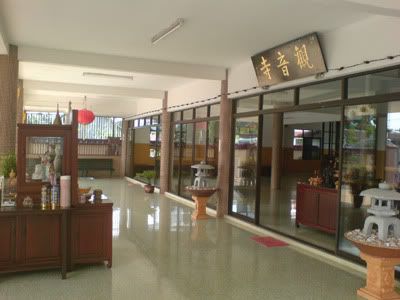
For 6 - 7.5 hours each day, we will all be sitting in this meditation hall. The morning sittings are 1 hour long while the afternoon sittings are 1.5 hours long. What is meditation? Meditation is actually about understanding ourselves, especially our mind. In our day to day life, all our actions and decisions are driven by the thought process that is going on in our mind. Sometimes we decide or take action via feelings, via past experiences or just unknowingly. So if we understand our mind, we will be able to understand ourselves better.
And why do we sit? There are 4 postures to meditation: sitting, standing, walking and lying down. Sitting has the least body movement and our body actually rest when we are sitting down, so we can maintain this posture for long durations.
During meditation, we will concentrate on an object to strengthen our mind. The common object that is used is breathe meditation (anapanasati). This meditation object is the most common found in Buddhist meditation and meditation of other faiths. As time goes by, the mind will be more focused and stronger. Meditation in a way train the mind's observation and concentration strength.
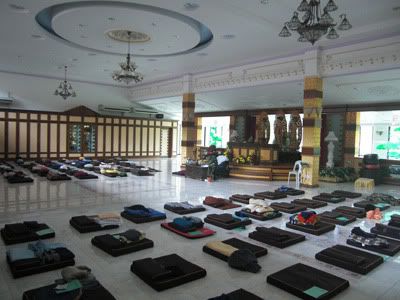
Here is how the male quarters looks like. There are 30 guys in all. The ladies quarters are at other parts of the temple and they are partitioned into smaller rooms. Ladies outnumbered the guys by a ratio 2:1. After lunch each time, we will be able to rest 2 hours. One of the focus of this retreat is to keep our lives as simple as possible and to appreciate the simple things in life. With the economic recession sweeping the world, it is a good time to realise that human livelihood actually can be very simple and happiness can be easily drawn from it.
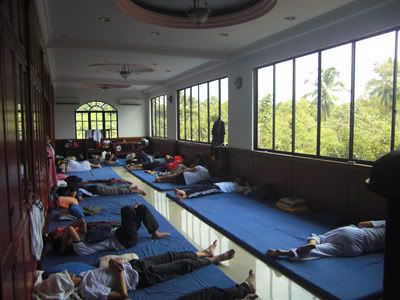
The body is also rested during this retreat session. We have meals twice a day, one in the morning at 6.30am, the other at the afternoon at 11pm. They are all vegetarian meals which are very healthy. Secondly, as our body do not move around much these few days, it is resting. Meditation has a direct health benefit to our body, it regulates our body energy and posture. So normally at the end of each retreat, everyone will feel more energtic and healthier. Sometimes I will have cold in the morning (caused by the male quarters' air-conditioning). 10mins into meditation, my cold will be cleared. If I do not do meditation, the cold will usually be aggravated.
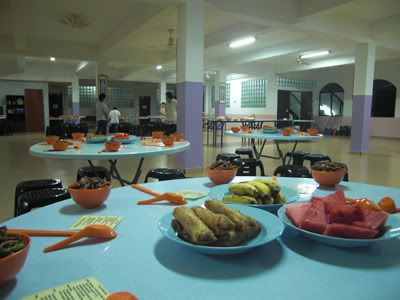
Before our meals, we have to set our motivation proper. As all our meals are donated, we are grateful to them for providing meals for us. And most importantly, do not get attached to the food we partake.
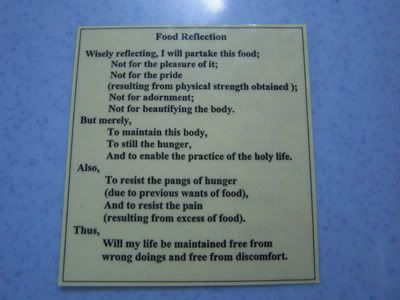
Here are my belongings. They have free-flow of water, thanks to the Dharma Workers, so we will never go thirsty. All of us have to carry a name tag with our name, group and the word 'Noble Silence' printed on it. And of course a small watch so we can keep track of the time.
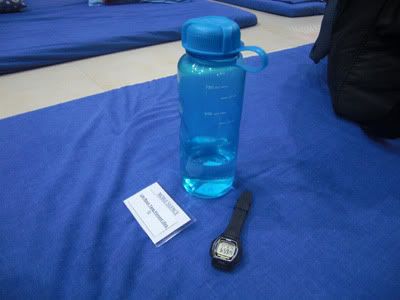
Just next to the temple is the railway track. A few times each day, we can hear the sounds of trains passing by. The station is only a 5mins walk away.
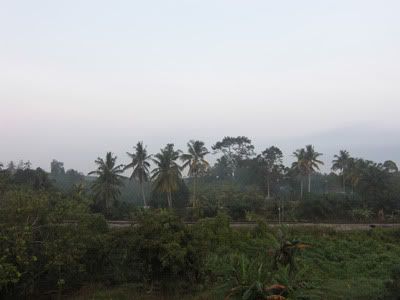
Almost everyday, the meditation teacher, Sayalay Dipankara will be giving a talk to us. They are mainly pointers on meditation and also stories from the Buddha's time.
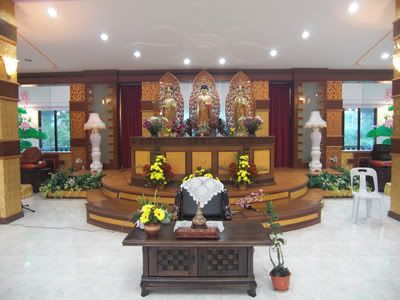
Here is our group photo. Throughout the retreat, we have some yogis who joined us and left. The photoshoot is on the last day.
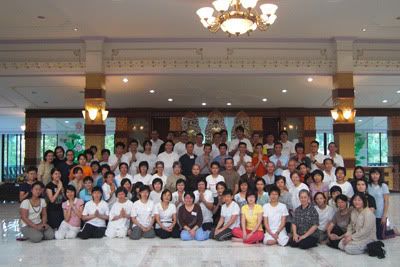
The next two photos are taken by Samuel. He is really a good photographer. So click on the photos for a larger version of it.
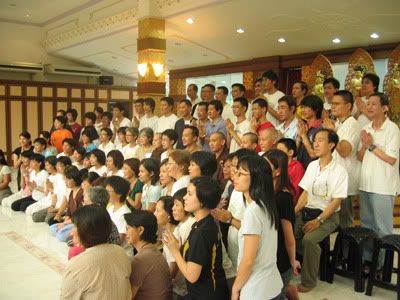
After phototaking, we have a feedback session.
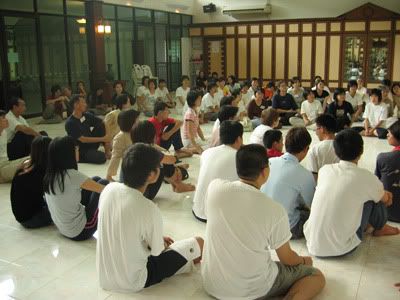
Here are the rules and regulations. The 8 precepts is based on the Buddhists' 8 precepts. These are usually undertaken on special days (1st day or 15th day of the lunar month), by all newly ordained monks or retreat practitioners. Note the NOBLE SILENCE in bold below. Noble silence is actually very important in a retreat setting. During last year's retreat, we were talking all the way, as a result, it is very hard to concentrate during the meditation sessions. Our mind tends to go back to the conversations we have.
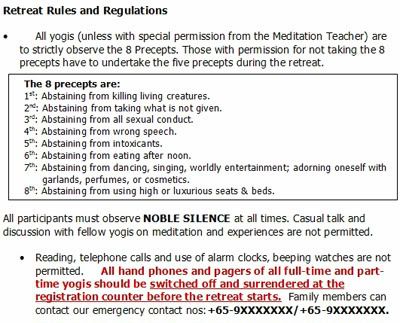
Here is our retreat schedule. For Area Cleaning, I am involved in cleaning up the meditation hall. One of my specialisations is now in the laying of meditation mats. (I have been doing it the last 2 weeks in Singapore cos it was also my group's duty for our weekly class). We are given 3 time slots of interview with the meditation teacher, Sayalay Dipankara. I went for all 3 of them on the Monday, Wednesday and Saturday. From the Tibetan teachings, I have learned that it is important to be around learned people or people of great wisdom, as they will directly/indirectly influence us.
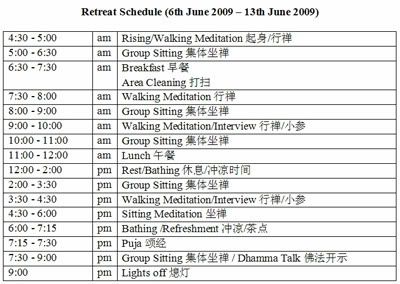
Finally, here is the way to practice. It is actually shown to us during last year's Pa Auk's retreat. For this retreat, we are into the second stage, the Purification of Consciousness, that is the training of the mind. As we delve deeper into Buddhism, we will realise that Buddhism is more a science than a religion. All the realizations and experiences are achieved by practicing. There is a difference between knowing impermanence than to realize impermanence. With a strong concentration, only then will we be able to realize it and look into the reality of the world. The paths taught by the Buddha and the Arahants are also realizable for anyone, so there is actually a great sense of equality to Buddhism.
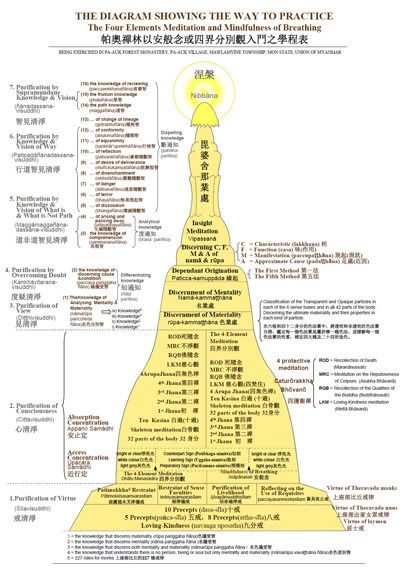
Meditation is the most difficult activity to people. Besides the most difficult part of observing the mind, here are also some common phenonmenon observe by the yogis: During the first day, yogis are normally sleepy as we have to wake up early in the day. By the second day, we will start to notice our mind has many wandering thoughts, thinking of past and future. By the third day, our legs or body will start to feel pain as we are not used to sitting on the floor for long duration. Normally by the fourth or fifth day, people will be used to the retreat environment. By the seventh or eighth day, it will be sayonara to retreat.
The perception of the world around is very much different after the 10 days. It really feels like we are living in a Matrix (the movie) world. Everyone is so caught up in their mind-thoughts. Just try to observe people around when you are in public transport and you will notice they fall in the following category: lost in thoughts, listening to music (to kill the boredom) or sleeping. Their minds are constantly running, never stopping. As a result, happiness are also always fleeting, never permanent. True happiness really come from within and not external. And it is so simple~